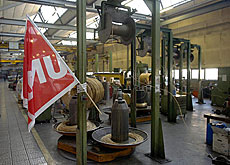Job market facing sea change

An ageing population, an increasingly knowledge-based society, European integration, globalisation – what do these issues mean for Swiss workers?
Renzo Ambrosetti, co-president of Unia, Switzerland’s largest single trade union, and Peter Hasler, director of the Swiss Employers’ Association, give swissinfo their views of the Swiss job market.
Labour Day, on May 1, is traditionally an opportunity to consider relations between employers and employees including a look back over the past year.
2005 was marked by a debate over “exorbitant” manager salaries and several labour conflicts notably at a metal factory in the village of Reconvilier in northwestern Switzerland.
swissinfo: While the big firms post record profits and the top managers pick up telephone-number salaries, workers’ wages are barely keeping up with rising prices – is this divide good for the social climate?
Renzo Ambrosetti: It certainly triggers people’s emotions. These greedy managers are the same ones who during pay negotiations are worried about their firms’ competitiveness while the workers get thrown a few crumbs. The public is irritated by such people, who harm those business leaders who behave normally. Certain members on the employers’ side have begun to notice this.
Peter Hasler: No, the divide is not good at all – the fact that the public have been discussing this topic for years reflects this.
swissinfo: Regarding the free movement of people within the European Union, you agree that supporting measures to prevent labour abuses are having an effect, but have fears of wage dumping disappeared?
R.A.: No, the fears have in no way been eliminated. Although the measures are working, they are not being applied everywhere. The number of checks has increased by 60 per cent, but half of those were carried out in three cantons: Ticino, Vaud and Zurich. For that reason we’re demanding a comprehensive enforcement of the checks.
P.H.: No, without checks the situation would be even worse but the measures reassure outlets and employees.
swissinfo: As for social planning and the age of retirement, on the one hand there is the union initiative for a flexible age of retirement after 62 and on the other employers and the Federal Commission for Economic Issues who want to raise it to over 65.
R.A.: At the moment the only people who take early retirement are those who can afford to – and that’s not fair. We need flexible models and suitable solutions for the diverse employee categories – as suggested by our initiative.
For certain types of job it’s possible to consider solutions which involve working beyond 65. However there are many people, mostly lower earners, who are shut out of the market after 50 or 55. In these cases it’s pointless to call for a higher age of retirement.
P.H.: The fixed age of retirement could be made more flexible by considering current possibilities, a parallel flexibilisation of the pension system, a comprehensive strategy for old age which enables part-time work after 65 and further measures.
Sixty-five would then be a time for calculating retirement which could at a later date be raised without further problems.
swissinfo: How realistic is the proposal by trade unions given a growing imbalance between the working population and old age pensioners?
R.A.: We can afford early retirement if we fund it through an increase in Value Added Tax and higher deductions from salaries.
It’s crucial to prevent the generations from drifting apart. Let’s not forget foreign labour that helps bolster social security by their mandatory financial contributions to the welfare system.
P.H.: I think the trade union initiative defies any reason. Healthy people should not be encouraged to take early retirement.
It doesn’t make sense from a financial and economic point of view. Many international experts say incentives for an early retirement should be reduced.
swissinfo: Appreciation for the older generation is one thing. But is the message taken on board by the companies which prefer hiring younger people?
R.A.: Companies have to come under more public pressure. It’s not fair to let older people go and leave them at the mercy of invalidity or unemployment schemes.
But in the recent past many companies have admittedly changed their policy towards the older generation for the better.
P.H.: First of all there are more young people than on the job market. We will shortly publish policy guidelines for companies and hope for a lively debate on the issue. Applying our proposals is probably not always going to be an easy task.
But a change in attitude towards the older generation has already taken place, because companies lost valuable know-how or clients and business partners complained about the absence of experienced personnel.
swissinfo-interviews: Renat Künzi and Marzio Pescia
Unia is Switzerland’s largest single trade union with more than 200,000 members. It represents mainly employees of the construction and engineering industry, as well as the catering sector.
Unia, which was created through a merger of several unions in 2005, is jointly led by Renzo Ambrosetti and Vasco Pedrina.
Peter Hasler is the director of the main employers’ association, representing more than 70 regional and local organisations.
The association was founded in 1908 and has its headquarters in Zurich. Alongside the Swiss Business Federation it aims to promote the Swiss economy and ensure its competitive edge.

In compliance with the JTI standards
More: SWI swissinfo.ch certified by the Journalism Trust Initiative
You can find an overview of ongoing debates with our journalists here. Please join us!
If you want to start a conversation about a topic raised in this article or want to report factual errors, email us at english@swissinfo.ch.